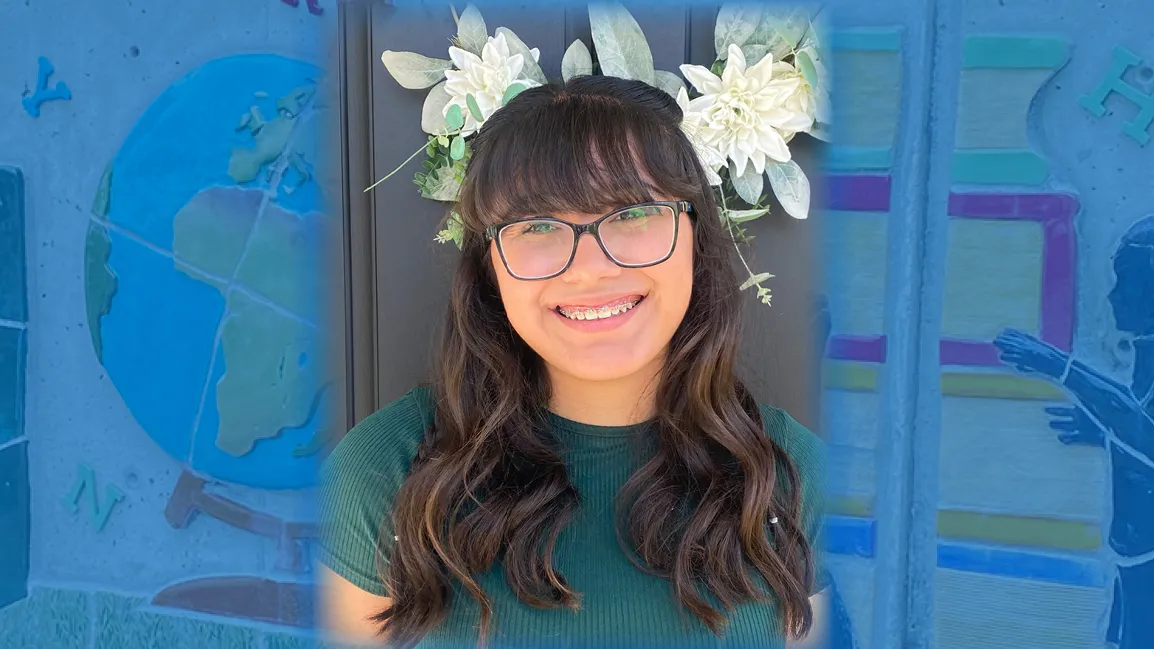Alan Llavore | Office of Marketing and Communications | (909) 537-5007 | allavore@csusb.edu

Rosaura Valenzuela, who wants to be a bilingual educator, is the recipient of the first-ever Spanish Bilingual Outstanding Student Award.
Jordi Solsona-Puig, the co-coordinator of the Spanish Bilingual Authorization Program, presented the award to Valenzuela during the credential ceremony in the spring for Cal State San Bernardino’s James R. Watson and Judy Rodriguez Watson College of Education.
The Spanish Bilingual Authorization Program prepares teacher candidates with the linguistic, cultural, and pedagogical skills needed to provide qualitative bilingual education to students from diverse backgrounds. The program emphasizes the development of culturally proficient teaching practices, collaboration with families and communities, and using educational technology to enhance language and content learning.
Not only was Valenzuela the first to receive the Spanish Bilingual Outstanding Student Award, but she was also the first to be awarded the Integrated Bilingual Authorization Program Grant.
She also worked as an ambassador of the 2024 Dual Immersion Symposium at the Watson College of Education, chaired by Solsona-Puig, where more than 130 attendees learned the latest trends in bilingual education and translanguaging.
“Rosaura has excelled in every aspect as a candidate in the Spanish Bilingual Authorization,” said Solsona-Puig, an assistant professor of education. “She was the first student awarded for the Integrated Bilingual Authorization Program, which covers full tuition. As well, I was able to witness her growth as a student in my classes and in my role as a supervisor for teacher candidates at Redwood Elementary into a Dual Immersion Language program in Spanish. Her teaching skills in two languages were impressive, and as an experienced teacher, seeing the sparks in the eyes of the students she taught was a transformative experience.”
Valenzuela was born into a first-generation family and grew up primarily speaking Spanish at home. She did not formally learn English until she was enrolled in preschool and kindergarten. Throughout elementary school, she would go on to be reclassified as an English learner and would continue to speak Spanish only at home.
While in secondary school, she moved to Mexico, where she would complete grades seven through nine in a Spanish-only private Catholic school. Although it was a difficult transition for her, she preserved with the biliteracy skills she had developed at home. Attending an only Spanish-speaking school allowed her to further develop the language and expand her knowledge of the grammatical aspect of the language.
Following secondary school, returning back to the U.S. she felt confident enough with her Spanish to enroll in a Spanish for Spanish Speakers II class and then proceed into Advanced Placement (AP) Spanish Language and AP Spanish Literature, tests she would both pass.
Her Spanish teachers told her that when she registered for college classes, she could choose a Spanish minor since her AP credits gave her a great advantage.
Valenzuela started her academic career at CSUSB in 2020, beginning her undergraduate coursework in Liberal Studies-Integrated track with a minor in Spanish. She continued to take collegiate-level Spanish classes in her sophomore year. By the time she entered CSUSB’s multiple-subject credential program, she learned about the bilingual authorization option and pursued that track.
She was placed in a second-grade dual language immersion classroom to complete her supervised student teaching. This is where she realized she wanted to be a bilingual educator.
“Growing up in a bilingual household, I want nothing more than to continue to help further generations develop biliteracy in their education as I did,” Valenzuela said. “Being bilingual has opened up many doors in both professional and personal settings. It not only has provided me with opportunities to grow as a person, but it also has allowed me to connect with my community on a more personal level and better adapt to their needs. Biliteracy is a life skill that should be taught to all future generations to better assist them both in the present and the future.”